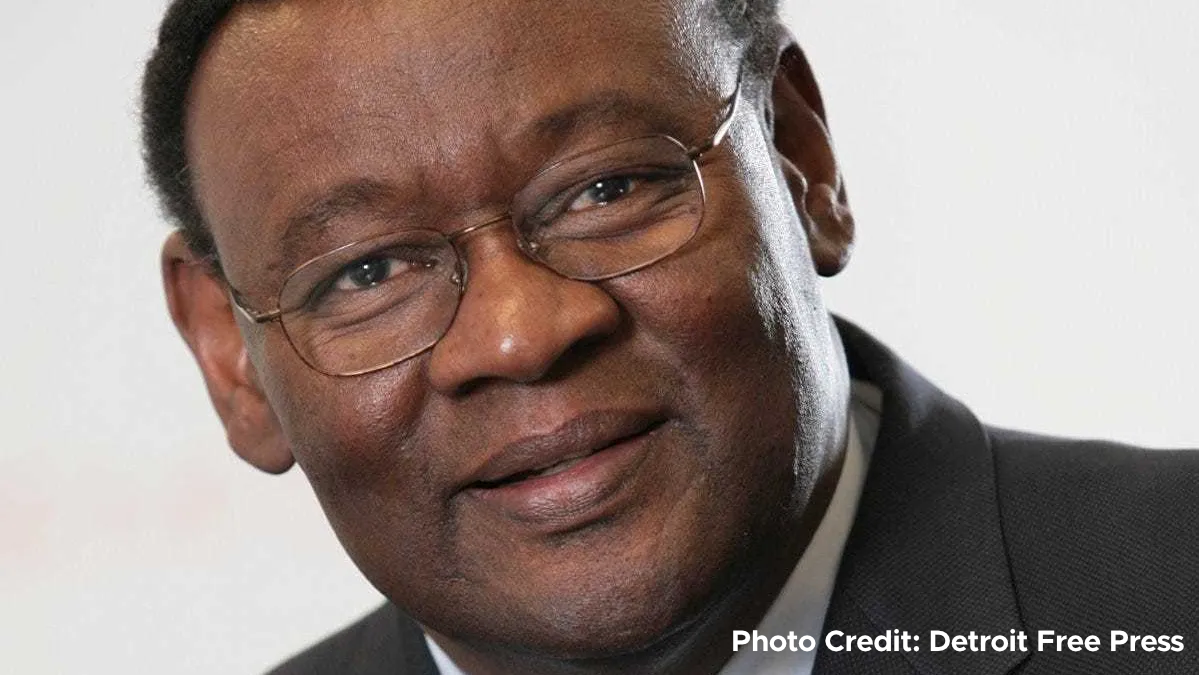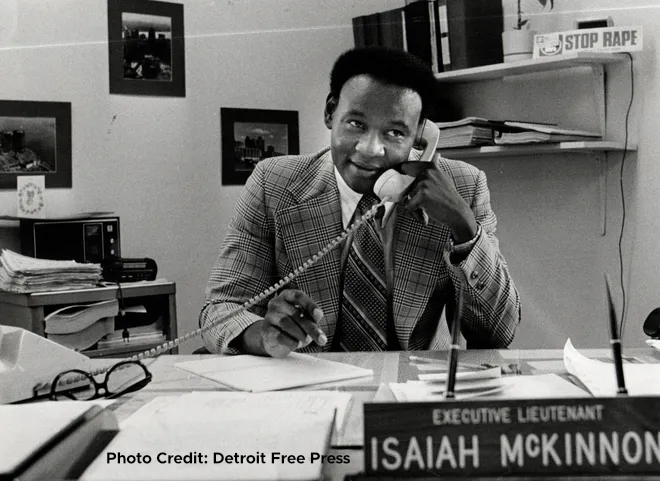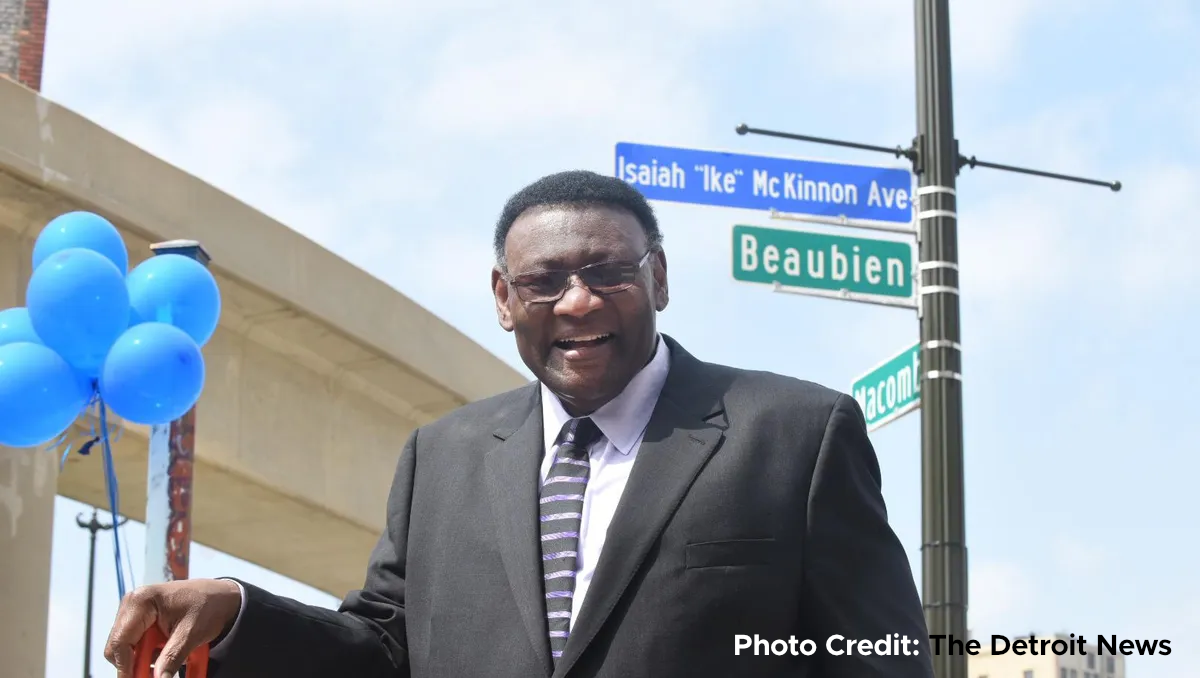Ike McKinnon: commitment to service
October 2, 2025 - JJ Thomas
 Dr. Isaiah (Ike) McKinnon is an alumnus of Michigan State University, former Chief of the Detroit Police Department, and former Deputy Mayor of the City of Detroit. However, before the accolades and titles, McKinnon was proof that one person’s commitment to service can change the community they live in for the better.
Dr. Isaiah (Ike) McKinnon is an alumnus of Michigan State University, former Chief of the Detroit Police Department, and former Deputy Mayor of the City of Detroit. However, before the accolades and titles, McKinnon was proof that one person’s commitment to service can change the community they live in for the better.
McKinnon's family moved to Detroit, Michigan when he was nine years old, to the same neighborhood as Detroit legends Diana Ross, Joe Louis, and Smokey Robinson. McKinnon attended Cass Technical High School in Detroit, which was among the best schools in the country at the time. After his first day, while walking home, the “Big Four” rolled up to the School’s parking lot.
In the 1950s, the Detroit Police Department assigned groups of four officers to patrol neighborhoods. The unit that patrolled Dr. McKinnon’s neighborhood was known as the “Big Four” by locals because of their brutality and harassment. This group of officers, according to McKinnon, could often be seen committing violent acts, such as throwing young men up against a wall.
As the Big Four pulled up to McKinnon, the officers grabbed him and threw him up against the car. One officer, known as “Rotation Slim,” punched McKinnon in the chest and stomach repeatedly and called McKinnon a range of derogatory names, many of which were in reference to his race. After the Big Four finally let him go, McKinnon says he ran home and locked himself in his room. He was just 14.
After this moment, McKinnon made a decision that would change the direction of his life forever. He would become a police officer to make sure that these kinds of things didn’t happen to anyone in the city of Detroit.
McKinnon would graduate from Cass Technical High School in 1961 and went on to enlist in the United States Air Force. After four years of service, including a deployment to Vietnam, McKinnon returned to Detroit to fulfill the promise he made to himself when he was 14. In 1965, at the age of 22, McKinnon was sworn in as a member of the Detroit Police Department.
McKinnon says being a Black officer in the Detroit Police Department (DPD) was hard. He describes experiencing overt racism from his fellow officers and from the public daily. “It was tough. There were days – eight-hour days – when the officer I rode with wouldn’t say a single word to me. Honestly, looking back on it, their goal was to make it so terrible that I would quit.” But McKinnon did not quit. He was committed to his mission to serve his community.
Two years into McKinnon’s tenure with the DPD, in 1967, he was called into duty when the Detroit Riots occurred to try to keep the peace and prevent the riots from expanding beyond 12th Street. Recalling this experience, McKinnon remembers the difficulty of operating in such a chaotic environment. “Here I was, standing on the line between the community members and the police, and tensions were high. I’m hearing my fellow officers calling the Black community members all sorts of terrible names, things that I found to be personally offensive. At the same time, I’m hearing my community members call me all sorts of terrible things because I was a police officer and a Vietnam veteran,” he said.
McKinnon was not relieved until 2 am that night and was expected to be back at work early that same morning. As McKinnon was driving home through the riots, he was pulled over by two Detroit Police officers. The officers ordered McKinnon to step out of the car, and despite still being in his uniform, the officers drew their guns. McKinnon vividly recalls stepping out of the car, hands in the air, and despite telling the officers that he was also a Detroit Police Officer, an officer pointed a gun at him, threatened him and called him racial slurs.
Being well trained on weapons in his time in the air force and as an officer, McKinnon realized that the officer was beginning to slowly pull his trigger. Acting immediately, McKinnon leapt into his car, kept his head down and sped off. When he got back to his apartment, McKinnon called his Sergeant to tell him what had happened, but no investigation into the matter took place, despite the incident receiving widespread media attention.

But McKinnon stayed true to his personal mission and began working his way up the ranks of the DPD. He decided to pursue a bachelor’s degree. “I wanted to get as much education as possible to make sure that people in the community understood that there were actually people like me who were honestly trying to make a difference,” said McKinnon. His pursuit of a bachelor's degree at the University of Detroit led to a master's degree from Mercy College of Detroit, which led to McKinnon earning his doctoral degree in Education from MSU in addition to graduating from the FBI National Academy and U.S. Secret Service School of Dignitary Protection. He accomplished all this while working full time and starting a family. McKinnon says that he wanted to pursue a PhD not only to advance his own education, but to set a positive example for his family and his community.
At MSU, McKinnon befriended professors Dr. Eldon Nonnamaker (College of Education) and Dr. Robert Trojanowicz (School of Criminal Justice). These two professors, according to McKinnon, were a big reason he was successful in his doctoral program, and over time, they also became his friends. “Here I was, a Detroit police officer and a student. These two professors, we’d go out to lunch or dinner, and they’d ask me questions about what it was like to be an officer and what my thoughts were on different topics. They were actually interested in what I had to say and would listen. I was always in awe that these two highly regarded professors, experts in their field, were interested in what I had to say. I have never taken that for granted,” he said.
In 1993, Mayor Dennis Archer named McKinnon Chief of Police for the Detroit Police Department. His first objective as Chief was to regain the trust of the public. The former Chief of Police was embroiled in an embezzlement scandal, and community members were reporting other officers for engaging in unethical behavior. McKinnon called a meeting with all members of the DPD administration and said, “We are going to make a difference in this city. We are going to make changes. We are going to build community trust, and we will also be a well-educated department.”
One of the changes McKinnon implemented was a requirement for executive-level officers in the Detroit Police Department to have a master's degree or above. McKinnon says that this was to ensure that only officers who were committed to changing the department would rise to positions of power. This change also led to an increase in the number of rank-and-file officers obtaining a bachelor’s degree. The DPD was quickly becoming one of the best-educated departments in the country. McKinnon says this was important in order to show the community that they were committed to change.
McKinnon retired from the Detroit Police Department in 1998, 33 years after joining. After retirement, McKinnon transitioned to academia, serving as a Professor of Education at the University of Detroit Mercy, embodying the same commitment to his students that his professors did at MSU.
In 2012, McKinnon joined Mike Duggan’s campaign and was named Deputy Mayor. McKinnon eventually returned to academia before officially retiring in 2020. In addition to his roles in academia and politics, McKinnon is a published author, having written three books related to the field of law enforcement, and served as a consultant for multiple news outlets about law enforcement and security.


